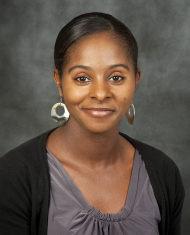Recent events have thrust the reality of racism – both subtle and overt – into the national headlines. What does resiliency research tell us about the challenges that face various races and ethnic groups and resiliency? This question seems especially relevant to our work with children and teens, many of whom face the additional burdens of racial discrimination and living in a culture that too often stereotypes people of various races in negative ways.
Resiliency is about successfully dealing with whatever life challenges we are confronted with. Racism is for many a huge challenge. Are the same strategies that help people overcome a variety of other life challenges, traumas, and crises also applicable in dealing with racism? Research has been done on this question…Read on for details! (First, I address the topic of African American resiliency and then resiliency across many cultures…)
The Best Research I Have Found on “African American Resiliency…”
 Dr. Danice L. Brown (pictured here) has done some of the best research I have found on African American resiliency. In her research report “African American Resiliency: Examining Racial Socialization and Social Support as Protective Factors” she notes: “African Americans, in comparison to their White counterparts, are more likely to face poverty, live in violent neighborhoods, have less financial resources, and have higher mortality rates from disease” (pp. 32 – 33). But she adds: “Yet while African Americans are at risk for poor developmental outcomes there are many who are able to overcome the negative consequences of their environments and experience a healthy quality of life.”
Dr. Danice L. Brown (pictured here) has done some of the best research I have found on African American resiliency. In her research report “African American Resiliency: Examining Racial Socialization and Social Support as Protective Factors” she notes: “African Americans, in comparison to their White counterparts, are more likely to face poverty, live in violent neighborhoods, have less financial resources, and have higher mortality rates from disease” (pp. 32 – 33). But she adds: “Yet while African Americans are at risk for poor developmental outcomes there are many who are able to overcome the negative consequences of their environments and experience a healthy quality of life.”
Dr. Brown then describes the power of PROTECTIVE FACTORS in the African American community that help foster resiliency in the face of such significant challenges. In her review of the literature relating to African American resiliency, she highlights the protective factors that appear to be most powerful in the African American Community:
- Specific messages of “racial socialization” provided to children by their families and their extended community.
- A wide variety of expressions of “caring and support” provided to children and youth by families, the extended community – including churches – and other caring adults in their lives.
This information can help all of us strengthen these especially powerful protective factors identified by Dr. Brown.
SPECIFICALLY, families and other caring adults and organizations that provide African American children and youth with modeling and messages and exposure to environments that “emphasize racial pride” and explore “learning about one’s heritage” are offering the most powerful aspect of the racial socialization protective factor. (Dr. Brown notes that the research literature is “mixed” re: “the receipt of messages emphasizing the existence of racism and racial barriers.”)
Dr. Brown also notes that the many types of family, extended family, church, and extended community support that is often inherent in the African American culture offer an enormously powerful protective factor as well. “These internal support systems may often serve as [African American’s] first line of defense when dealing with psychological distress” (p. 34).
The specifics of this support range from “tangible aid” to “emotional support, advice, and information.”
Religiosity and/or spirituality comes up across studies as an important protective factor for individuals of all races. Dr. Brown highlights the historical role churches have played in “contributing to the psychoeducational development of children and provide them with additional role models” (p. 35).
Dr. Brown concludes that “promoting cultural pride and the teaching of heritage and history” as well as receiving support, “including the support of a special person [who is not part of immediate family]” (p. 43) is significantly associated with resiliency among African Americans.
Her research validates the power of “believing, alternate mirrors” that I have written about elsewhere, including in The Resiliency Workbook. It also confirms the finding across resiliency research that the most powerful protective factor in anyone’s life is genuine caring and support. She elucidates in detail, however, the multitude of sources of this powerful support typical in the African American community and she emphasizes a unique protective factor: Developing racial pride and learning about cultural and racial history and heritage.
CLICK HERE TO READ THE ENTIRE RESEARCH REPORT
| Please share this page -> |


